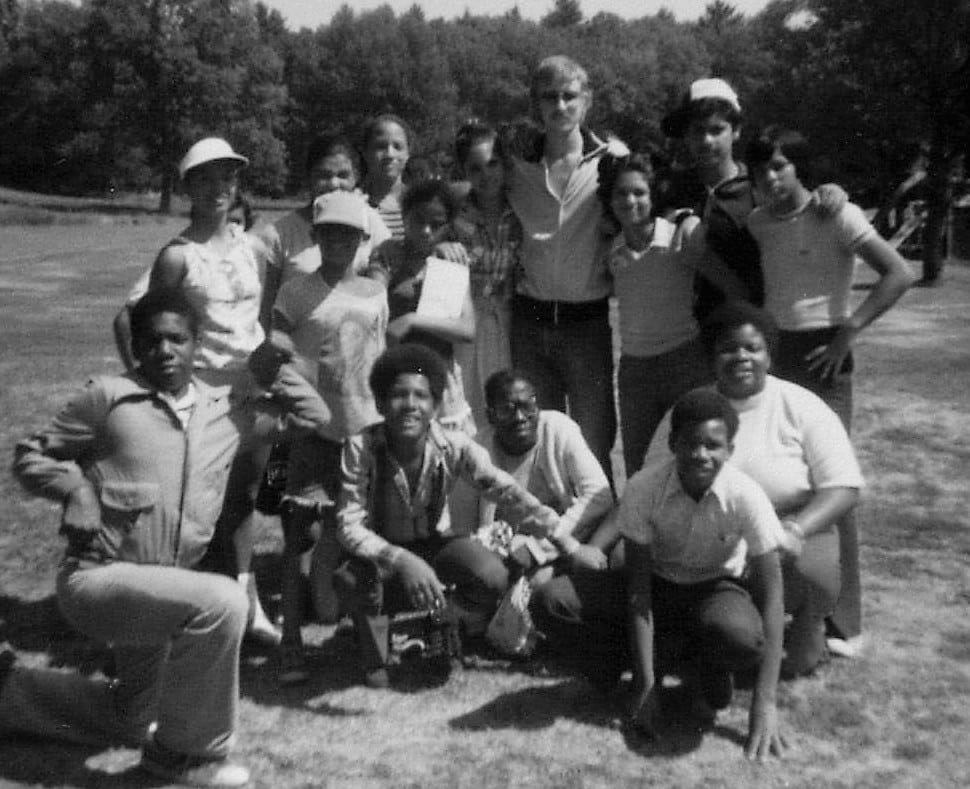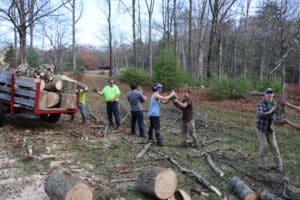How Could You Not Like It?
Jim Baer was 18 years old and working at Agway, a vegetable seed packaging company in Pennsylvania, when he was briefly laid off. At the urging of his former high school shop teacher, Wes Newswanger, Jim went to Camp Deerpark for three weeks in June of 1977 to help build the new pool. “After my short stint at camp, I went back to Agway and became a foreman,” Jim said. “But I couldn’t get Camp Deerpark out of my mind. So I quit my job and returned to camp in the fall of ’77 as a volunteer for one year.” Jim worked as a maintenance assistant and as a counselor in 1978.
While working with the campers, Jim began to understand why Camp Deerpark was so important. “I think that camp was mainly about breaking down stereotypes,” he said. “Camp was a place where different cultures would meet and people would come away from it knowing more about one another. Camp put both staff and campers in a situation where we maybe had some fears, but that put us on common ground. We might not have had the same fears or assumptions, but somehow the barriers could melt away because we were in a different place.”
Jim saw a transformation in some of the kids he worked with. “I saw them become aware of another part of creation,” he said. “For some of my kids, it was the first time they were out of the Bronx, so yeah, they were terrified at night. Many of the kids were afraid of how dark it would get at camp, in comparison to the city where there were always lights. But then they would look up and see the stars, and maybe they’d never seen them before. It was incredible.”
Camp Deerpark also helped break down assumptions Jim had about city life, and was influential in his decision to move to New York City. Shortly after his year of volunteer work at camp ended, Jim moved to the Bronx to work with Lowell Jantzi, helping to maintain the Mennonite-owned buildings in the city. “Lowell was the sole employee and needed help,” Jim said. Jim rented a room at the voluntary service house on Sherman Avenue for about six months. “I had a ton of fun, helping Lowell and living with the VSers.”
After returning home to Pennsylvania and working for a time, Jim again couldn’t keep Camp Deerpark out of his mind. “Three hundred acres of woods: How could you not like it?” he asked. He moved back to camp when Mim Cruz was the director in 1981. In 1982 Jim became the camp administrator. That year he also got married and his wife, Valerie, joined him at camp.
Jim had grown up on a farm in Lancaster County and had the grand idea of bringing the farming culture that he knew to Camp Deerpark. He especially wanted to bring cows, but they needed a place to house them first. In 1983, Jim suggested a barn raising.
“Dale Stoltzfus had some Amish relatives, so we hatched this idea to try to have some Amish come up from Lancaster County and have some city people come out from New York City,” Jim said. “We’d bring these two cultures together and we’d raise a barn up in one day.” Jim recalled that about 80 people from New York City and about 15–20 Amish people came to camp on a Saturday in June, and they did just that. The Amish women served homemade donuts and strawberry pie, while the Amish men worked on the barn. The New Yorkers helped in whatever way they could. After the barn was completed, Jim brought in black beef cows to raise for the summer. They were on loan from a camp neighbor, Walter Mehr. The campers got to watch the cows as they grazed, in the area where the gazebo now stands.
Jim also fondly remembers working in the kitchen at camp. “There weren’t assigned jobs, so everyone would pitch in where they could,” Jim said. “I remember it as a time of pulling together and making the most of a rather mundane job.”
Jerry and Leonor Kennell would often help out in the kitchen when Jim was there, too. The three of them would burst into song while washing dishes or cleaning up from after a meal and their voices would carry throughout the main house. Guests would come and knock on the door to see what was going on. Some would stand for a while and listen while others would applaud when they were finished. Singing in the kitchen is one of Jim’s most cherished memories from his time at camp, as it was a reflection of how happy the staff was as they worked together. “At different times, retreat guests would comment on how meaningful it was to come to a camp where the staff worked and played together in this fashion,” Jim said.
Because Jim never attended college, he counts his four years at Camp Deerpark and time living in New York City as his college experience. It was there that he interacted with a variety of cultures and had new experiences. He also learned new skills that would affect the rest of his life. He became a shop teacher at a local Mennonite school in Lancaster County, where he worked for 33 years. He is now self-employed in home renovation work. “I would be somewhere else and someone different if I didn’t have that camping experience,” Jim said.
Jim still visits camp from time to time and keeps in contact with many of the staff members that worked with him. He worked at another camp in rural Pennsylvania but said it wasn’t the same as Camp Deerpark. “The urban piece was missing,” he said. “Camp Deerpark was the best of both worlds for me; you had a rural setting but yet it was affiliated with the New York City churches. Yeah, I just loved that setting.”
Jim hopes that camp stays the same—full of energy and fun, but also that the cultural overlap remains. “The interaction of different cultures is what makes Camp Deerpark special,” he said.
—Written by Dillon Hershey and Donna Stoltzfus.
Jim Baer, volunteer at camp from 1977–78, returned to serve as camp administrator with wife Valerie from 1981–83.
Related Entries
Share:
Come and Pray Lunch & Retreat
Come and PrayPrayer Day with Lunch March 14, 9am-3pm~$30~ Overnight Prayer RetreatMarch 13-14includes March 14 Lunch~$120~ Come seek the Lord’s face with your faith family from all over the Tristate region for a relaxing time of prayer and discussion. We know God is doing amazing things — and he will continue to do more as…
Time to Pray
As followers of Jesus, he is our example in everything. When Camp says in our mission statement that we are “a community of Christ” – this is what we’re saying: we’re a group of people dedicated to the purpose of following and being like Jesus. So the question is, how do we follow Jesus as…
A Place of Prayer
Prayer — especially “vertical prayer” for specific God-revealed mission set apart from the concerns of our life and ministry — is a major theme for Camp in 2026. Maybe you read about this in the Winter Newsletter article “Time to Pray“? We want to extend the invitation to the entire Camp community and beyond —…
Living Abundantly Retreat
Jesus promised his followers an abundant life. Is that just an abstract idea to distract us from earthly misery, or is there real power in Christ to live a full and rich life in the here and now? Young adults are navigating a challenging landscape as they start “adulting” and building a life, so we’ll…
Forgiving Debts: 2025 Woodcutting Season
When Jesus taught his disciples to pray (Mt 6:9-15), he described two big realities where “thy Kingdom Come, thy will be done on Earth as it is in Heaven” are realized in the human world: First, he said “give us this day our daily bread”, acknowledging that God’s provision for human need is a central…
“How Do I Donate?”
Recently, a thirteen-year-old guest at Camp asked Operations Director Kevin Smith, “how do I donate?” Kevin was honestly a little surprised, but was happy to see this young member – who was on retreat with one of our owning churches — taking some initiative. Kevin directed him to the website Donate page, and the young…
The Discipleship Down-Low
Defining Discipleship 18 And Jesus came and said to them, “All authority in heaven and on earth has been given to me. 19 Go therefore and make disciples of all nations, baptizing them in the name of the Father and of the Son and of the Holy Spirit, 20 teaching them to observe all that I have commanded…
The Virtuous Wife
This past weekend, Camp hosted three women’s retreats at Camp. Though the retreat groups were very diverse in background – one was from an urban church plant in Philadelphia, one was from a Garifuna Mennonite church in Brooklyn (an Afro-Caribbean Culture), and one was from a multi-ethnic faith community reaching out in North Jersey. Though…
A Life of Service
I believe the most important thing to God is not our personality, knowledge, or talents, but our availability. How willing and ready are we to respond when He calls, and how ready are we to do what He says? What use to the Lord are people who could do what he wants with excellence and…
Building Belonging
At our February NYC LMC District meeting, we’re discussing the Belonging phase of The Journey Map. In this first phase on the map, individuals and groups on a spiritual journey begin the process of connecting to each other and evaluating the place they may have in each other’s lives. Have you ever been an outsider…





